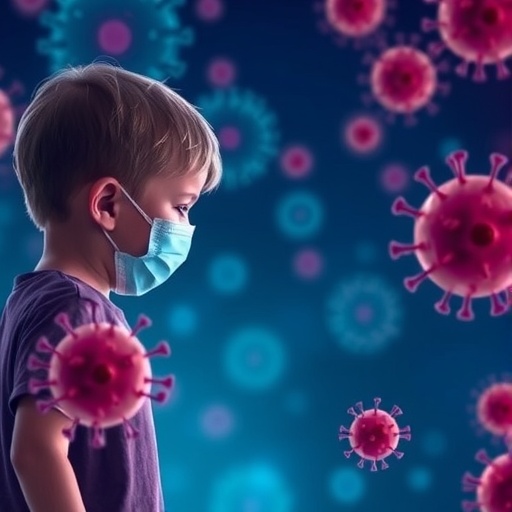A groundbreaking study funded by the National Institutes of Health (NIH) has unveiled alarming new evidence regarding the risks posed by COVID-19 reinfections in children and adolescents. Challenging the widespread assumption that COVID-19 infections in the young population are generally mild and that subsequent infections carry minimal risk, this large-scale investigation reveals that children who contract COVID-19 for a second time are twice as likely to develop long COVID compared to those with only a single prior infection. The comprehensive research, recently published in The Lancet Infectious Diseases, provides an unprecedented view into the long-term health consequences of COVID-19 reinfections in youths, shedding light on a critical but underappreciated public health concern.
The study particularly highlights myocarditis—a dangerous inflammation of the heart muscle that can severely impair cardiac function and even be fatal—as the most frequent long COVID-associated condition in pediatric reinfections. After a second COVID-19 infection, the risk of myocarditis was found to triple relative to the risk seen after the initial infection. This points to the potential for escalating cardiovascular complications in children upon reinfection that may have serious implications for their long-term health.
In addition to myocarditis, the researchers documented a more than two-fold increase in the incidence of blood clots among children who experienced COVID-19 more than once. Blood clotting disorders in the young can lead to strokes, pulmonary embolism, and other life-threatening events, underscoring the gravity of repeated viral exposure. Beyond these conditions, reinfected children also faced heightened risks of kidney damage, arrhythmias characterized by abnormal heartbeats, severe headaches, debilitating abdominal pain, and profound fatigue. These multifaceted complications collectively contribute to the complex clinical syndrome known as long COVID.
Dr. Ravi Jhaveri, co-author of the study and Head of Pediatric Infectious Diseases at Ann & Robert H. Lurie Children’s Hospital of Chicago, stresses that vaccination remains a cornerstone of prevention. He emphasizes that increased vaccine coverage could substantially diminish the number of COVID-19 infections and thereby reduce the prevalence of long COVID manifestations among children. The findings strongly advocate for concerted public health efforts to improve vaccination rates and mitigate the potential for recurrent infections in pediatric populations.
The investigative team derived their conclusions from an exhaustive analysis of electronic health records (EHR) encompassing over 465,000 children and adolescents spanning from January 1, 2022, to October 13, 2023. This timeframe coincided predominantly with the circulation of the Omicron variant, which has been noted for its enhanced transmissibility. By leveraging this vast dataset, the researchers were able to capture accurate longitudinal data detailing both initial infections and reinfections along with subsequent health outcomes, providing a robust foundation for their findings.
This study represents the first and largest longitudinal EHR-based assessment focused specifically on pediatric long COVID after reinfection. It forms part of the NIH-sponsored RECOVER Initiative, a landmark research consortium comprised of 40 children’s hospitals and health institutions across the United States dedicated to unearthing the long-term sequelae of COVID-19. The scale of collaboration and data integration involved is unprecedented in pediatric infectious disease research and reflects an essential investment in national pediatric health infrastructure.
Yong Chen, PhD, the study’s senior author and Director of PennCIL at the University of Pennsylvania Perelman School of Medicine, acknowledges the formidable logistical and analytical challenges this research entailed. He underscores that without comprehensive support and infrastructure, conducting such an extensive and diverse pediatric investigation into long COVID would have been nearly impossible. The study’s success demonstrates the critical role sustained funding and coordinated data sharing play in advancing scientific understanding during a global health crisis.
Looking ahead, the researchers have outlined plans to continue tracking this cohort of pediatric patients over longer periods to assess the enduring impacts of COVID-19 reinfections. They aim to determine how emerging COVID-19 variants influence the risk profile for long COVID and to identify potential interventions or strategies that could prevent or ameliorate these serious long-term outcomes. Such efforts will be pivotal in tailoring healthcare approaches and public health policies for safeguarding children’s health in the ongoing pandemic.
Moreover, this study’s revelations disrupt the narrative that COVID-19 is uniformly mild in children and highlight the vulnerabilities introduced by reinfection. Such knowledge signals the urgency for vigilant public health messaging and reaffirms the vital importance of preventative measures, including vaccinations, booster doses, and possibly non-pharmaceutical interventions, to protect pediatric populations from repeated viral assaults that may precipitate chronic health conditions.
Ann & Robert H. Lurie Children’s Hospital of Chicago, a nonprofit institution committed to fostering excellence in pediatric care and research, spearheaded this research alongside Northwestern University Feinberg School of Medicine. Their combined dedication to pediatric health innovation through the Stanley Manne Children’s Research Institute was crucial in achieving these insights. Lurie Children’s status as a leading pediatric hospital reinforces the credibility, clinical relevance, and impact of this critical work.
The implications of this study extend beyond clinical care to influence policy, educational outreach, and community awareness efforts. It underscores the necessity of integrating pediatric perspectives into broader COVID-19 response frameworks. Given the complex, multi-organ manifestations of long COVID uncovered here, medical professionals, educators, and families must be informed and vigilant to recognize and address these challenges among children recovering from reinfections.
In conclusion, this seminal research delivered by a pioneering collaboration reveals that the threat of long COVID in children is substantially amplified by reinfection. The findings demand urgent public health attention and reinforce vaccination as a potent tool against both COVID-19 infection and its hazardous long-term consequences. As the global community continues navigating the evolving pandemic landscape, protecting children’s health through science-driven strategies remains paramount.
Subject of Research: Long COVID in children and adolescents following COVID-19 reinfections
Article Title: Long COVID Risk in Children and Adolescents After SARS-CoV-2 Reinfection
News Publication Date: 2024
Web References:
Keywords: COVID-19, Long COVID, Pediatric Infectious Diseases, SARS-CoV-2 Reinfection, Myocarditis, Blood Clots, Pediatric Health, Omicron Variant, NIH RECOVER Initiative, Electronic Health Records, Vaccination, Chronic COVID Sequelae




